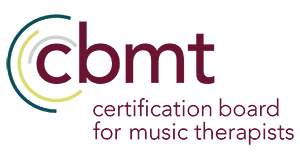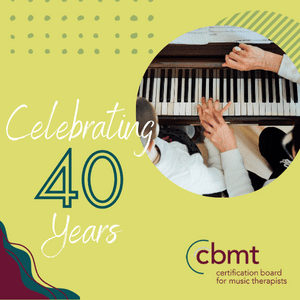CBMT Leadership Reflects on the Value of Certification in Music Therapy as the Organization Celebrates 40 Years
THOUGHT LEADERSHIP
As CBMT celebrates 40 years of changing lives through music therapy, its board members, executive leadership and certificants have been weighing in on the organization’s impact over the decades and the value of certification in the field.
Alaine Reschke-Hernandez, PhD, MT-BC and Chair, CBMT Continuing Education Committee, elected to volunteer for the Continuing Education Committee because the Committee’s work specifically addresses how to support and challenge music therapists to continually learn and grow.
“Lifelong learning is crucial to ensure that board-certified music therapists provide quality services…particularly as the evidence base (clinical wisdom, research, and client situations) that informs our practice evolves.”
On May 9, 1983, CBMT was initially formed with funding provided by the two predecessor organizations, the National Association for Music Therapy (NAMT) and the American Association for Music Therapy (AAMT), that eventually merged and became the American Music Therapy Association (AMTA). Since then, CBMT has been performing the important work of certifying music therapists and being intricately involved in ensuring the lifelong learning that is so important.
In the beginning, CBMT was testing for both NAMT and AAMT. Today, CBMT tests not only for all music therapists who fall under the umbrella of AMTA, but for music therapists across the globe.
CBMT’s commitment has helped to create a healthy, vibrant community of music therapists – over 10,000 strong – who are impacting clients worldwide, and that community of certificants is active and vocal. When CBMT conducted its Certificant Perception Survey a few years ago, the message was clear that music therapists are passionate about what they do – almost 90% are happy to be music therapists – and they appreciate the value certification brings. In fact, over 97% of respondents believe CBMT successfully sets standards of excellence for safe and effective music therapy to enhance clients’ lives.
Why is certification so essential to the success the field of music therapy has experienced?
Here’s what the nearly 96% of certificants who planned to recertify stated as the top two reasons they value CBMT certification:
- Certification provides evidence of professional commitment
- Certification provides an indication of a higher level of clinical competence
One survey respondent said: “Board certification is a standardized recognition and requirement for this profession…it is absolutely important as a benchmark for other professions to recognize.”
Another survey respondent commented: “If it’s not MT-BC, it’s not music therapy.”
Laura Lenz, LPMT, MT-BC, a long-time Exam Committee Member, agrees: “The value of having a board-certified music therapist lies in the assurance that this person, the person you are entrusting with the wellbeing of your loved one, is an educated professional, practicing with the highest regard for safety, excellence, and accountability,” she said.
“The only way to ensure this is to maintain credentialing standards that reflect current, evidence-based research in a multitude of areas and practices, as well as establishing the highest accountability for excellence in clinical practice as possible.”
Laura Lenz has served on the CBMT Exam Committee for five years, and she is proud of the impact the committee has had on the field: “Having committee members who come from different regions, theoretical orientations, educational backgrounds, all of whom share the same desire to be of service to our profession, has truly led to incredibly impactful and meaningful changes.”
In considering some of the changes CBMT has made possible over the last 40 years, Joy Schneck, MM, MT-BC, Executive Director, provided just a few memorable examples:
“Forty years has seen so much change! CBMT transitionally certified 2,626 certificants in 1985 and administered its first exam in November of 1985 for 120 candidates. Today, we offer over 1,400 administrations a year. Some additional milestones since our founding:
- CBMT received its first NCCA accreditation approval in 1986, and accreditation has been ongoing ever since, with the next renewal in 2026.
- The Recertification Program began in 1988 to ensure continuing competence and meet accreditation requirements.
- Webinars outlining the processes for testing, practice analysis, and recertification were developed and offered at no cost for certificants.
- Testing moved from one administration a year, with results mailed a month later, to twice a year, and eventually to computer-based testing, which is offered daily, seven days a week and provides instant scoring.
- Two Self-Assessment Exams were developed to assist with exam preparedness and are revised every five years as part of the Practice Analysis process, as is the Board Certification Domains.
- Working collaboratively with AMTA, the State Recognition Plan began in 2005, and we now have music therapy recognition in seventeen states, with more to come!
CBMT has grown at a constant rate of 5-7% annually, from 1,972 certificants in 1993 – after 52% of the certificant body did not renew after the very first recertification cycle – to an average of 80% renewing today completely online. There are currently 10,211 certified today! We have come a long way, and excitedly look forward to the future of more growth, provision of quality services, unlimited continuing education opportunities, and a greater number of states with recognition!”
It was all made possible by the music therapists who make up CBMT – people who volunteer on the board and committees, and those who work in the field and live out every single day the value of what music therapy can accomplish in the lives of the people who are impacted.
“With more than 10,000 certificants, I think we are going to experience a snowball effect of new ideas and change, and probably even more interest in joining the profession. With all of this growth and change in mind, our Approved Provider program is an exciting aspect of CBMT that will help meet demands for learning opportunities related to emerging areas of practice, such as telehealth.” – Alaine Reschke-Hernández
“Without volunteers and certificants promoting the field and offering their service, I’m not sure that CBMT and music therapy as a profession would have grown as much in the last forty years,” said Ellary Draper, PhD, MT-BC and CBMT Board Chair. “My work at CBMT has impacted me in how I strategically think about the issues facing our profession, as well as possible solutions.”
What does CBMT’s Board Chair think lies ahead for the organization?
“I see CBMT continuing to grow and music therapy continuing to grow as a profession. I also have appreciated the hard work by CBMT’s staff and volunteers as we seek title protection and state recognition. I want to see continued progress across the nation, and I’m confident we will meet the goal of having title protection and/or state recognition in all 50 states.”
Visit cbmt.org to learn more about CBMT’s role in the field of music therapy.



